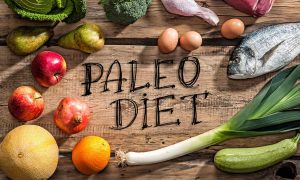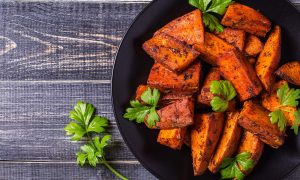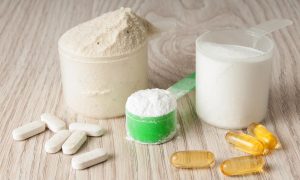Four Of The Main Risks Associated With Flexible Dieting

|
|
Let’s face facts – dieting in order to burn fat and potentially build muscle in the process is not an enjoyable experience. We all know just how difficult it can be to lose fat and gain muscle, especially if you happen to have a relatively slow-burning metabolism in the process. When we diet in an attempt to lose weight, we often find ourselves craving a selection of unhealthy foods that we know we aren’t allowed to eat. For example, if you’ve just tucked into a plate of steamed chicken and veggies, you’ll often still find yourself hungry, and perhaps craving a huge slice of chocolate cake and ice cream for dessert. But what if you could eat the foods you loved, and still lose fat and build muscle in the process? Well, theoretically, you can, thanks to what is known as “flexible dieting”. To some of you this may sound like a fantastic thing, and you may feel like all your Christmases and birthdays have come at once, but be warned, there are a number of risks and dangers associated with flexible dieting, four of which we’ll be taking a look at in this very article. Before we get to the risks and dangers however, let’s first take a look at what exactly flexible dieting is.
What is flexible dieting

Nowadays, thanks to a number of online coaches and PTs, there is a new way of dieting, known as flexible dieting. If you speak to these individuals, they’ll go into great detail about how it works, and will use a whole bunch of scientific terms and phrases that mean very little to most people. To help make things as black and white as we possibly can however, the basic theory behind flexible dieting, is that you can eat and drink whatever you like, so long as it fits into your daily macronutrient requirements. Each person has a specific number of calories that they require daily in order for their bodies to maintain themselves in their current states. Say for example, a person requires 2000 calories per day for maintenance, a certain percentage should come from carbohydrates, some should come from fats, and some should come from protein. Flexible dieters will therefore eat whatever they like, making sure that they don’t go over their daily macro requirements. That means that they’ll eat slices of pizza, pop tarts, ice cream, cakes, and other processed foods, just making sure to count calories and macronutrient contents of each item.
What are the main dangers?
So, you’re probably thinking by now that flexible dieting sounds pretty great, and whilst it can indeed help you to lose fat and potentially build muscle in the process, there are a number of pretty serious risks and dangers associated with it, including the following:
It promotes binge eating
A lot of so-called “flexible dieters” will actually often starve themselves throughout the day, consuming only a few hundred calories, and will then save all of their calories up until the evening, where they will then tuck into a large and unhealthy dinner, along with dessert in the process. Eating in this way is unhealthy as it slows down your metabolism and actually makes you think that binge eating is a normal way of eating. We shouldn’t starve ourselves all day so that we can eat a pizza or a bacon double cheeseburger meal, we should instead keep our bodies fuelled up on healthy and balanced foods, by eating every three hours or so.
Lack of nutrients

Don’t let people fool you, they’ll tell you that flexible dieting is all about eating healthy 90% of the time, and treating yourself now and then without feeling guilty, yet if you take a look at their social media posts, you’ll see that the majority of their calories will indeed be coming from processed junk food which contains little-to-no nutritional value in the slightest. The human body needs healthy and balanced foods in order to function correctly, yet if you deprive yourself of fruits, vegetables, and wholesome foods packed full of vitamins and minerals, you’re only going to make yourself unhealthier and put yourself at risk of becoming ill in the near future.
Poor athletic performance
Say you are looking to head into the gym, pump some iron, and have yourself one heck of a workout in order to help you bulk up and burn fat, you’re going to need to have the right fuel in your body beforehand. For example, a lot of pre-workout meals may consist of foods such as oatmeal, egg whites, and fruit, or rice, grilled chicken, and broccoli perhaps. These foods are all healthy and are therefore very forgiving on the digestive system, and have been proven to help contribute towards enhanced athletic performance. If however, you’re following a flexible dieting routine, and decide to grab yourself a cheeseburger, fries, and milkshake before you workout, how do you think you’re going to feel? Sure, they may very well “fit your macros” but if you’ve got a stomach full of trans fats, grease, starchy and sugary carbs, heavy cream, and various other artificial chemicals, do you honestly think you’re going to perform as well as if you’d eaten a clean and healthy meal? No, of course you won’t, you’ll feel bloated, sluggish, lethargic, and would much rather go and have a lay down on the sofa than a workout in the gym.
Risk of serious health issues

As mentioned previously, the idea behind flexible dieting is the fact that you’re allowed to eat unhealthy foods that taste good, and still lose weight in the process. these foods however, are often processed and pumped full of sugar, salt, trans fats, and artificial chemicals and ingredients that do the body no good in the slightest. If you’re eating these foods every day, you’re filling your body full of chemicals and eventually it is going to say ‘enough is enough’ and you’re going to get sick. You may get lucky and suffer a slight stomach bug/digestive issue, or you could be more unfortunate and could suffer from cardiovascular disease, stroke, heart attack, or even cancer due to all of the carcinogens that you’re putting into your body. Just because you aren’t fat, this does not mean that you’re healthy, so just bear that in mind.
References: https://breakingmuscle.com/uk/nutrition/why-if-it-fits-your-macros-is-not-worth-the-risk














